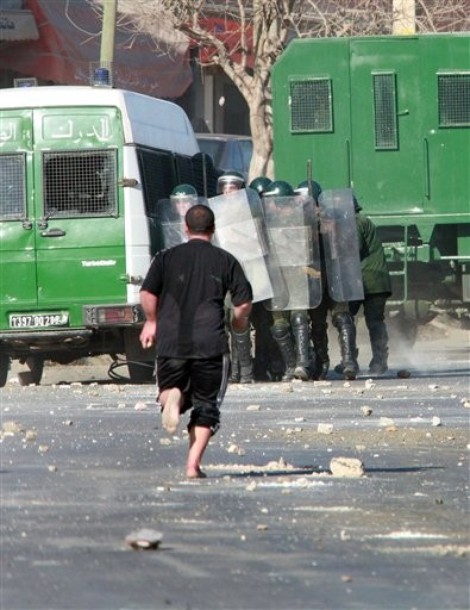Algeria: How a "Fundamental Political Deficit" Leads to Demonstrations (Roberts)
 Hugh Roberts writes for Foreign Policy:
Hugh Roberts writes for Foreign Policy:
The massive wave of protests that have engulfed Algeria and the recent unrest in Tunisia are both premised on a fundamental political deficit --- the absence of credible political institutions capable of ensuring adequate representation of the society and so keeping the executive branch of the state under the kind of critical observation and pressure necessary to good government.
Algeria Updates: Parties React as Government Offers Concession on Sugar and Cooking OilIt has been widely suggested that the riots have been food or hunger riots, in that they were supposedly triggered by the steep increases in the prices of staple goods, notably sugar and olive oil. These increases were not decreed by the government; the private sector traders appear to have raised prices of their own accord, in reaction to the government's attempts to impose new regulations on their transactions. The government's decision was, in principle, part of the necessary and long overdue attempt to curb the rampant informal sector of the economy by subjecting the trade in foodstuffs to basic regulation and so bring it back into the formal sector. But if so, the government has clearly had no conception of the political difficulty and magnitude of this task and seems to have supposed that it could effect changes of this nature by simple ministerial fiat.
But there can be little doubt that the price increases were simply the last straw. The greater part of Algerian society has been in a permanent state of moral revolt against the regime for the last four or five years. In particular, riots have been a frequent -- one might well say a regular -- feature of the Algerian political landscape for the last decade, since the massive and protracted riots in Kabylia, the main Berber region, in 2001. Since 2005, scarcely a fortnight has gone by without a riot somewhere in the country.
The immediate motives have varied from case to case but have usually been connected to the state's failings as a distributive state. In January 2005, numerous communities across the country rioted over the steep increase -- in the depths of winter -- in the price of butane gas on which households depended for heating. The allocation of new public housing by local authorities has frequently been contested by the unlucky claimants, with angry demonstrations, accusing mayors of nepotism and corruption, often turning into bitter affrays. At other times, many villages and even entire municipalities have rioted as the last resort, having despaired of attracting the regional authorities' attention to their particular, long-neglected needs, whatever these might be (water supply, electrification, repair of the only road, a decent school or clinic) by more orderly procedures.
What all these forms of riotous assembly over the years have had in common is the visceral refusal of la hogra -- the arrogance and contempt with which the authorities at all levels routinely treat ordinary Algerians. At the same time, these varied resorts to direct action have universally expressed the Algerian public's disenchantment with the political parties and institutions established since the introduction of formal political pluralism in 1989.
 Algeria,
Algeria,  Foreign Policy magazine,
Foreign Policy magazine,  Hugh Roberts
Hugh Roberts 
Reader Comments